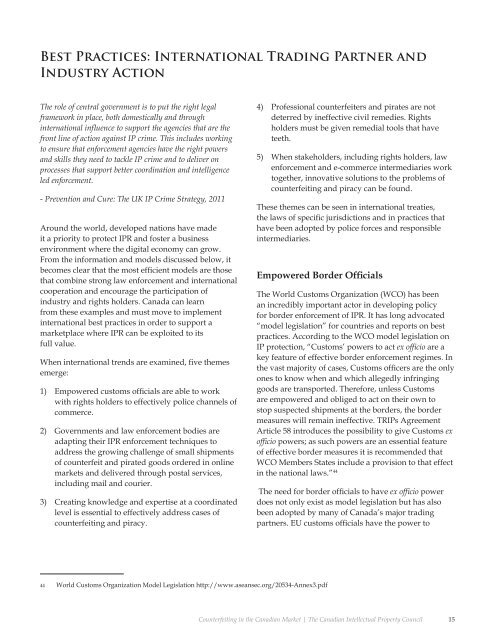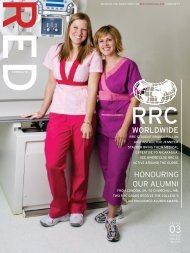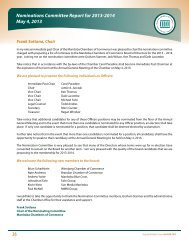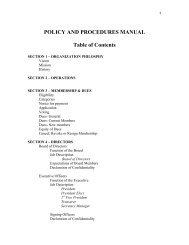Best Practices: International Trad<strong>in</strong>g Partner andIndustry ActionThe role <strong>of</strong> central government is to put <strong>the</strong> right legalframework <strong>in</strong> place, both domestically and through<strong>in</strong>ternational <strong>in</strong>fluence to support <strong>the</strong> agencies that are <strong>the</strong>front l<strong>in</strong>e <strong>of</strong> action aga<strong>in</strong>st IP crime. This <strong>in</strong>cludes work<strong>in</strong>gto ensure that enforcement agencies have <strong>the</strong> right powersand skills <strong>the</strong>y need to tackle IP crime and to deliver onprocesses that support better coord<strong>in</strong>ation and <strong>in</strong>telligenceled enforcement.- Prevention and Cure: The UK IP Crime Strategy, 2011Around <strong>the</strong> world, developed nations have madeit a priority to protect IPR and foster a bus<strong>in</strong>essenvironment where <strong>the</strong> digital economy can grow.From <strong>the</strong> <strong>in</strong>formation and models discussed below, itbecomes clear that <strong>the</strong> most efficient models are thosethat comb<strong>in</strong>e strong law enforcement and <strong>in</strong>ternationalcooperation and encourage <strong>the</strong> participation <strong>of</strong><strong>in</strong>dustry and rights holders. Canada can learnfrom <strong>the</strong>se examples and must move to implement<strong>in</strong>ternational best practices <strong>in</strong> order to support amarketplace where IPR can be exploited to itsfull value.When <strong>in</strong>ternational trends are exam<strong>in</strong>ed, five <strong>the</strong>mesemerge:1) Empowered customs <strong>of</strong>ficials are able to workwith rights holders to effectively police channels <strong>of</strong>commerce.2) Governments and law enforcement bodies areadapt<strong>in</strong>g <strong>the</strong>ir IPR enforcement techniques toaddress <strong>the</strong> grow<strong>in</strong>g challenge <strong>of</strong> small shipments<strong>of</strong> counterfeit and pirated goods ordered <strong>in</strong> onl<strong>in</strong>emarkets and delivered through postal services,<strong>in</strong>clud<strong>in</strong>g mail and courier.3) Creat<strong>in</strong>g knowledge and expertise at a coord<strong>in</strong>atedlevel is essential to effectively address cases <strong>of</strong>counterfeit<strong>in</strong>g and piracy.4) Pr<strong>of</strong>essional counterfeiters and pirates are notdeterred by <strong>in</strong>effective civil remedies. Rightsholders must be given remedial tools that haveteeth.5) When stakeholders, <strong>in</strong>clud<strong>in</strong>g rights holders, lawenforcement and e-commerce <strong>in</strong>termediaries worktoge<strong>the</strong>r, <strong>in</strong>novative solutions to <strong>the</strong> problems <strong>of</strong>counterfeit<strong>in</strong>g and piracy can be found.These <strong>the</strong>mes can be seen <strong>in</strong> <strong>in</strong>ternational treaties,<strong>the</strong> laws <strong>of</strong> specific jurisdictions and <strong>in</strong> practices thathave been adopted by police forces and responsible<strong>in</strong>termediaries.Empowered Border OfficialsThe World Customs Organization (WCO) has beenan <strong>in</strong>credibly important actor <strong>in</strong> develop<strong>in</strong>g policyfor border enforcement <strong>of</strong> IPR. It has long advocated“model legislation” for countries and reports on bestpractices. Accord<strong>in</strong>g to <strong>the</strong> WCO model legislation onIP protection, “Customs’ powers to act ex <strong>of</strong>ficio are akey feature <strong>of</strong> effective border enforcement regimes. In<strong>the</strong> vast majority <strong>of</strong> cases, Customs <strong>of</strong>ficers are <strong>the</strong> onlyones to know when and which allegedly <strong>in</strong>fr<strong>in</strong>g<strong>in</strong>ggoods are transported. Therefore, unless Customsare empowered and obliged to act on <strong>the</strong>ir own tostop suspected shipments at <strong>the</strong> borders, <strong>the</strong> bordermeasures will rema<strong>in</strong> <strong>in</strong>effective. TRIPs AgreementArticle 58 <strong>in</strong>troduces <strong>the</strong> possibility to give Customs ex<strong>of</strong>ficio powers; as such powers are an essential feature<strong>of</strong> effective border measures it is recommended thatWCO Members States <strong>in</strong>clude a provision to that effect<strong>in</strong> <strong>the</strong> national laws.” 44The need for border <strong>of</strong>ficials to have ex <strong>of</strong>ficio powerdoes not only exist as model legislation but has alsobeen adopted by many <strong>of</strong> Canada’s major trad<strong>in</strong>gpartners. EU customs <strong>of</strong>ficials have <strong>the</strong> power to44 World Customs Organization Model Legislation http://www.aseansec.org/20534-Annex3.pdf<strong>Counterfeit<strong>in</strong>g</strong> <strong>in</strong> <strong>the</strong> <strong>Canadian</strong> <strong>Market</strong> | The <strong>Canadian</strong> Intellectual Property Council 15
deta<strong>in</strong> and seize goods on an ex <strong>of</strong>ficio basis. 45 In <strong>the</strong>event <strong>of</strong> an ex <strong>of</strong>ficio seizure, <strong>the</strong> EU customs <strong>of</strong>ficialsmust notify <strong>the</strong> rights holder and have an applicationfor action submitted with<strong>in</strong> three work<strong>in</strong>g days. 46However, because <strong>the</strong> EU has a comprehensive rightsregistration process that facilitates applications tocustoms <strong>of</strong>ficials, less than 5% <strong>of</strong> seizures arise from ex<strong>of</strong>ficio action. 47Some <strong>of</strong> Canada’s trad<strong>in</strong>g partners have takenadditional steps to ensure customs <strong>of</strong>ficials havereliable <strong>in</strong>formation about counterfeit products.They have developed registry systems that allowrights holders to provide identify<strong>in</strong>g <strong>in</strong>formationabout legitimate trade-marked product which is <strong>the</strong>navailable to customs <strong>of</strong>ficials. This aids <strong>of</strong>ficials <strong>in</strong>easily identify<strong>in</strong>g counterfeit product and prevent<strong>in</strong>g<strong>the</strong> import, export or transshipment <strong>of</strong> such product.For EU customs <strong>of</strong>ficers to be most efficient, rightsholders must furnish <strong>the</strong>m with detailed <strong>in</strong>formationabout <strong>the</strong> products. The European Commission (EC)strongly encourages cooperation with rights holders,as this facilitates <strong>the</strong> risk assessment capacities <strong>of</strong>customs. If rights holders suspect that counterfeitcopies <strong>of</strong> <strong>the</strong>ir goods may transit through customs,<strong>the</strong>y are encouraged to fill out two applications foraction, one national and one community wide, whichwill provide <strong>the</strong>m with customs detention orders.These should <strong>in</strong>clude <strong>in</strong>formation about <strong>the</strong> goods, <strong>the</strong>rights <strong>in</strong>volved, <strong>the</strong> type <strong>of</strong> fraud suspected, as wellas <strong>in</strong>formation on <strong>the</strong> au<strong>the</strong>ntic goods. This processhas been very successful, with authorities report<strong>in</strong>gthat more than 18,000 applications for action weresubmitted by rights holders <strong>in</strong> 2010, 48 even though <strong>the</strong>rights holder agrees to cover all <strong>of</strong> <strong>the</strong> cost associatedwith <strong>the</strong> process. 49 In order to ease <strong>the</strong> adm<strong>in</strong>istration<strong>of</strong> this process, customs authorities have published amanual for rights holders on how to lodge communityand/or national applications for action. 50The EC has also <strong>in</strong>itiated COPIS, a new onl<strong>in</strong>e databasefor both national and community applications foraction, set to beg<strong>in</strong> <strong>in</strong> <strong>the</strong> second quarter <strong>of</strong> 2012. Thiswill make access to <strong>the</strong> application system easier forrights holders and customs <strong>of</strong>ficials. Developments<strong>in</strong> <strong>the</strong> EU <strong>in</strong>clude <strong>the</strong> proposal <strong>of</strong> new legislationthat would replace EC 1382/2003, extend<strong>in</strong>g IPRenforcement and streaml<strong>in</strong><strong>in</strong>g <strong>the</strong> process for rightsholders. 51Similarly, <strong>in</strong> <strong>the</strong> United States, <strong>the</strong> Customs andBorder Patrol (CBP) works very closely with <strong>in</strong>dustry,on which it is dependent for <strong>in</strong>formation on possible<strong>in</strong>stances <strong>of</strong> counterfeit<strong>in</strong>g. A recordation applicationservice exists for rights holders, which <strong>the</strong>n providesagents with specific <strong>in</strong>formation on goods, <strong>in</strong>clud<strong>in</strong>gmarkers <strong>of</strong> au<strong>the</strong>nticity <strong>of</strong> <strong>the</strong> genu<strong>in</strong>e articles andtrends <strong>in</strong> counterfeit<strong>in</strong>g <strong>of</strong> <strong>the</strong> product. In 2011 <strong>the</strong>CBP approved 2,087 <strong>of</strong> <strong>the</strong>se applications, 52 which arepaid for by rights holders and last for one year. TheCBP has made <strong>the</strong> system easier for rights holdersuse with an “E-Recordation” system that allows forspeedier <strong>in</strong>formation-shar<strong>in</strong>g between parties. 53 This<strong>in</strong>formation is stored <strong>in</strong> <strong>the</strong> CBP’s Intellectual PropertyRights Search (IPRS) database, to which agents across<strong>the</strong> country have access. 5445 COUNCIL REGULATION (EC) No 1383/2003 <strong>of</strong> 22 July 2003 concern<strong>in</strong>g customs action aga<strong>in</strong>st goods suspected <strong>of</strong> <strong>in</strong>fr<strong>in</strong>g<strong>in</strong>g certa<strong>in</strong><strong>in</strong>tellectual property rights and <strong>the</strong> measures to be taken aga<strong>in</strong>st goods found to have <strong>in</strong>fr<strong>in</strong>ged such rights Article 4. Available at: http://eur-lex.europa.eu/LexUriServ/LexUriServ.do?uri=OJ:L:2003:196:0007:0014:EN:PDF46 Results at <strong>the</strong> Border 2010 at p. 10.47 Ibid48 Results at <strong>the</strong> Border, p. 949 EC Regulation1383/2003 Article 650 Results at <strong>the</strong> Border, p. 951 Ibid., p. 252 2011 US Intellectual Property Enforcement Coord<strong>in</strong>ator Annual Report on Intellectual Property Enforcement, p. 73. Available at:www.whitehouse.gov/sites/default/files/omb/IPEC/ipec_annual_2011_report.pdf53 US Customs and Border Protection Enforcement <strong>of</strong> Intellectual Property Rights, October 2009 p7. Available at: http://www.cbp.gov/l<strong>in</strong>khandler/cgov/trade/legal/<strong>in</strong>formed_compliance_pubs/enforce_ipr.ctt/enforce_ipr.pdf54 Ibid, p. 1516 <strong>Counterfeit<strong>in</strong>g</strong> <strong>in</strong> <strong>the</strong> <strong>Canadian</strong> <strong>Market</strong> | The <strong>Canadian</strong> Intellectual Property Council








